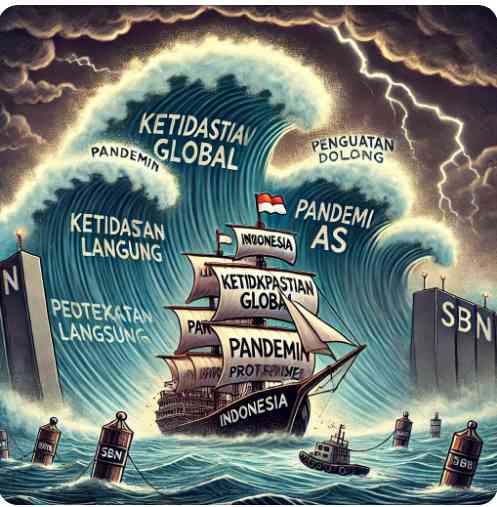Judul : Indonesian Sharia Banking in the Midst of Global Uncertainty
link : Indonesian Sharia Banking in the Midst of Global Uncertainty
Indonesian Sharia Banking in the Midst of Global Uncertainty

Indonesian Sharia banking industry shows significant resilience and growth amid various global economic challenges, including global interest rate fluctuations, geopolitical conflicts, and international financial market tensions.
According to the latest report from the Financial Services Authority (OJK) and Bank Indonesia, the assets of the Islamic banking industry exceeded Rp905 trillion in May 2025, growing by about 10.4% year-on-year (YoY). This growth is higher than the growth of conventional banking, which only recorded an increase of about 6.8% during the same period.
Consistent Growth and Long-Term Potential
This positive trend is a continuation of the growth over the past five years. Since the merger of three state-owned Islamic banks in 2021 into Bank Syariah Indonesia (BSI), the landscape of Islamic banking in Indonesia has undergone a major transformation, both in terms of services, inclusion, and competitiveness.
"This proves that Islamic banking not only survives, but rather develops in a challenging economic situation," said Mahendra Surya, Chairman of the OJK Board, during the Sharia Economic Outlook 2025, held in Jakarta.
She added that Islamic banking is now no longer seen as an alternative, but has become the main choice for many people, especially the younger generation who are increasingly concerned about ethical finance and Islam-based values.
Digitalization Becomes the Backbone of Growth
Digital transformation has become one of the main keys in expanding the reach of Islamic banking services. Large Islamic banks such as BSI, Bank Muamalat, and BCA Syariah have launched various digital innovations, ranging from online account opening, mobile banking features, to application-based financing platforms for SMEs.
As of May 2025, BSI recorded that their active digital customers have reached more than 6.2 million, with transaction volume reaching more than Rp240 trillion within the first five months of this year.
"Digitalization not only expands access, but also improves operational efficiency and customer service convenience," said Hery Gunardi, CEO of BSI.
Bank Muamalat also reported a 34% increase in the number of users of its digital platform in the last year, especially among millennials and micro business owners.
Promotion of Sharia Financial Inclusion
Islamic banking also plays a major role in supporting the national financial inclusion program. Products such as hajj savings, microfinancing based on qardhul hasan, and Islamic children's savings products are increasingly popular.
According to data from Bank Indonesia, in the first quarter of 2025, the number of banking accounts from the unbanked segment increased by 18.6%, indicating that this sector is able to reach communities that previously had no access to financial services.
One of the outstanding programs supporting this is "Santri Preneur Syariah," a collaboration between Islamic banks and thousands of Islamic boarding schools in Indonesia. This program provides financial literacy training and Sharia-compliant business capital financing to students and alumni of the boarding schools.
Challenge: Literacy and Regulation
Behind the positive growth, there are still some challenges that need to be faced. One of them is the low level of financial literacy in the community. According to the 2023 National Survey on Financial Literacy and Inclusion (SNLIK), the level of sharia financial literacy only reached 23.3%, far below the conventional financial literacy which is above 40%.
This has caused many people still not understanding the fundamental differences between the sharia system and conventional systems, whether in terms of contracts, fund management, or aspects of blessings and ethics.
Dr. Rini Fitria, an expert in Islamic economics from Universitas Indonesia, stated that increasing literacy should be a national priority. "Without proper education, the great potential of Islamic banking cannot be fully utilized."
In addition, further improvements are still needed in regulations related to financial syariah product innovations, such as digital retail sukuk, syariah insurance (takaful), and green sukuk financing products based on Islamic principles.
Contribution to the National Economy and ESG
Islamic banking also aligns with the principles of Environmental, Social, and Governance (ESG). Many Islamic banks have begun to apply the principles of sustainable finance in their funding, including for the renewable energy sector, organic agriculture, and eco-tourism-based SMEs.
For example, BSI has distributed more than Rp5.2 trillion in green financing during 2024, while Bank Muamalat supports cash waqf-based carbon offset programs.
Prospect: Indonesia Towards a World Islamic Financial Center
With the largest Muslim population in the world, strong government support, and rapidly developing financial technology, Indonesia has great potential to become a global center for Islamic finance.
The government through the National Sharia Economic and Financial Committee (KNEKS) targets the share of the sharia financial industry to increase to 20% of the total national financial industry by 2030.
Finance Minister Sri Mulyani Indrawati stated that Islamic banking will be an important part of the national strategy for developing the Islamic economy, which includes the halal industry sector, Islamic finance, Islamic entrepreneurship, and Islamic social finance.
"Indonesia is confident in leading the world in integrating Islamic values with modern financial systems," said Sri Mulyani at the ASEAN Islamic Finance Summit 2025.
Demikianlah Artikel Indonesian Sharia Banking in the Midst of Global Uncertainty
Anda sekarang membaca artikel Indonesian Sharia Banking in the Midst of Global Uncertainty dengan alamat link https://www.punyakamu.com/2025/07/indonesian-sharia-banking-in-midst-of.html
0 Response to "Indonesian Sharia Banking in the Midst of Global Uncertainty"
Post a Comment